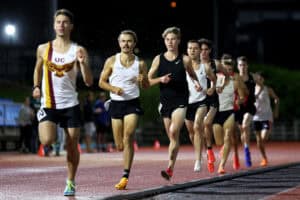Allegations of cheating in 2013 Comrades marathon, uncovered by statistician and Comrades runner Mark Dowdeswell, take time to prove, a KwaZulu-Natal Athletics (KZNA) spokesman said on Wednesday.

“The investigations are at the point where potentially 31 runners from the 2012 and 2013 races will be called to disciplinary hearings over the next few weeks,” Anand Naicker, the KZNA technical delegate to the 2013 Comrades Marathon said on Wednesday.
“At least five runners have already admitted guilt.”
Dowdeswell who identified 23 runners who had missed timing mats along the route in the 2013 race, highlighted a case where a runner had missed two mats in the second half of the race. The identified athlete had run the section from Drummond to Pietermaritzburg one hour and 39 minutes faster than the first half of the ultra marathon.
Athletes aspired to run the second half of the marathon in a faster time than the first half to get what is known as a negative split. Only two Comrades winners in the last 30 years have failed to achieve this.
However, runners typically achieve a difference of only a few minutes, not the hour and a half achieved by this particular runner.
“With 18000 entrants and 14000 starters, the post-race adjudication of each runner takes time and follows a strict procedure similar to that of a court,” said Norrie Williamson, an experienced IAAF technical official who had been involved in officiating at road races many years.
“The IAAF and ASA rules stipulate the process that has to be followed. This is more complex and rigorous when looking at potential disqualification or action after race day.”
The evidence needed to be conclusive and relied on a combinations of timing mats, photographs, webcam and TV coverage.
“The case has to be built in detail and only then can the process of calling a person to a hearing begin,” Williamson said.
“It isn’t sufficient to consider someone guilty simply because they failed to cross a mat, or ran a time that others feel he or she may not be capable of. There is a need to show the person was or wasn’t at a particular spot at a particular time.”
There had been cases where runners had changed shoes and forgotten to transfer the chip, or started the race without the chip but were clearly identified in the starting pen and then collected their chip further down the road.
The most common offences were cutting short the route, either by starting ahead of the race, or missing out sections of the route.
Each year, technological improvements increased the chances of detecting offenders. Cheating was not restricted to Comrades, or Two Oceans or to South Africa. It occurred in many races around the world.
In 1980, Rosie Ruiz not only took the New York underground to the finish of the marathon, but she used that race time to qualify for the Boston Marathon. She then cheated in Boston race to win the woman’s race in 2:31:56. She had her title stripped after it was discovered she had not run the entire course.
Comrades had also seen its share of cheats among the leaders and, despite the media attention, it takes weeks to gather sufficient documentation to prove a case.
In 1998, Herman Matthee caught a taxi to join the down race on Fields Hill 24km from the end and finish in seventh place. A year later, Sergio Motsoeneng, who finished ninth, was disqualified and banned from the Comrades for five years after it was discovered he had run the race in relay with his twin brother, 19-year-old Fika Motsoeneng.
– Sapa
Support Local Journalism
Add The Citizen as a Preferred Source on Google and follow us on Google News to see more of our trusted reporting in Google News and Top Stories.






